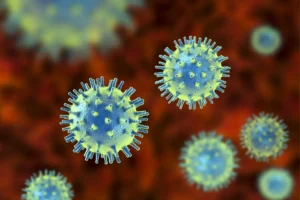The state of Kerala in southern India has confirmed its second case of Mpox, also known as Monkeypox, in a 38-year-old man from Malappuram district. The individual had recently returned from Dubai and showed signs of the virus, prompting him to self-isolate before seeking medical attention. This case comes shortly after another case was reported in Delhi, highlighting the need for continued vigilance and public health measures to contain the virus.
This case marks the 30th reported instance of Mpox in India since July 2022, according to the Union Ministry of Health. The country, while far from experiencing a widespread outbreak, continues to monitor suspected cases and take steps to control the disease’s spread.
Kerala’s Health Response to Mpox
Kerala’s Health Minister, Veena George, announced on Wednesday that the infected person had tested positive for Mpox after returning from the United Arab Emirates (UAE). The individual, noticing early symptoms, responsibly isolated himself from his family and sought medical assistance. His sample was sent for testing, confirming the presence of the virus. Currently, he is receiving treatment at Manjeri Medical College.
The state’s response to this development has been swift, with authorities urging people returning from abroad to seek immediate medical attention if they show any symptoms of Mpox. Kerala, known for its robust healthcare infrastructure, has already established isolation wards in 14 hospitals, including medical colleges, to manage potential cases.

Kerala’s First Mpox Case
Kerala reported its first Mpox case when the infected individual, also from Malappuram, showed symptoms after being admitted to the government medical college in Manjeri. His sample was sent to Kozhikode Medical College for testing, where it was confirmed to be positive. This first case served as a reminder of the importance of early diagnosis and isolation to prevent further spread.
Health Minister Veena George emphasized the need for vigilance among travelers, urging anyone displaying Mpox symptoms to report to healthcare providers immediately. This approach is part of Kerala’s proactive strategy to handle infectious diseases, which the state has gained recognition for in recent years, particularly during the COVID-19 pandemic.
Mpox Symptoms and Spread
Mpox, a zoonotic disease caused by the monkeypox virus, typically presents with flu-like symptoms such as fever, chills, swollen lymph nodes, and a characteristic rash that can spread across the body. While Mpox is generally less contagious than viruses like COVID-19, it can spread through close contact, including respiratory droplets and physical interaction with contaminated objects or surfaces.
In the case of Kerala’s most recent patient, self-isolation was initiated at the earliest signs of illness. This proactive step limited his contact with others and minimized the potential for spreading the virus. Local health authorities are working closely with the patient to ensure he receives appropriate care while continuing to monitor the situation closely for any further cases.
Mpox in India: The Bigger Picture
The most recent case in Kerala follows a report from Delhi, where a 26-year-old man from Hisar, Haryana, was found to be infected with Mpox. This case was reported in Safdarjung Hospital and is being treated as an isolated incident. India has seen a relatively low number of Mpox cases compared to global trends, with the Ministry of Health working to prevent further outbreaks.
India’s response to Mpox has included strengthening diagnostic capabilities and establishing protocols for isolation and treatment. In collaboration with the World Health Organization (WHO), India continues to adopt measures aimed at preventing the spread of the virus. However, sporadic cases like the ones in Kerala and Delhi underscore the need for continued public health efforts.
Global Context: WHO Declares Mpox a Public Health Emergency
The recent cases in Kerala and Delhi coincide with the World Health Organization’s (WHO) declaration of Mpox as a “Public Health Emergency of International Concern” (PHEIC). This global health alert was issued due to the virus’s rapid spread beyond its endemic regions in Africa. Historically, Mpox has been confined to parts of Central and West Africa, but recent outbreaks in non-endemic countries have raised alarms.
The WHO’s declaration signifies that global cooperation and preventive action are needed to curb the virus’s spread. While Mpox is rarely fatal, its impact on global health systems could be significant, especially if countries do not implement timely interventions.
India’s Preparedness: Isolation Wards and Public Health Directives
In response to the rising cases, Kerala has put in place several precautionary measures. In addition to the establishment of isolation wards in 14 hospitals, the state has instructed medical colleges to be on high alert for potential cases. Kerala’s health department is focusing on early detection, swift testing, and immediate isolation of suspected Mpox patients.
India’s preparedness extends beyond Kerala, with similar measures being implemented across various states to tackle Mpox. National guidelines have been issued for testing, treating, and isolating patients, ensuring that the healthcare infrastructure remains equipped to manage any outbreaks.
Lessons from the Pandemic: Kerala’s Robust Health Strategy
Kerala’s handling of Mpox cases mirrors its broader approach to public health. The state gained international praise during the COVID-19 pandemic for its aggressive testing, contact tracing, and isolation protocols. Kerala’s health authorities have leveraged these strategies in their response to Mpox, ensuring that any suspected cases are identified early and treated effectively.
The case in Kerala also highlights the importance of public cooperation in preventing the spread of diseases like Mpox. The infected individual’s decision to isolate himself before seeking treatment is an example of responsible action that can help limit transmission. Public health officials continue to stress the importance of self-reporting and isolation for anyone showing symptoms of the virus.
Final Thoughts on Mpox in India
With two confirmed cases in Kerala and one in Delhi, Mpox has gained national attention in India. Although the country is far from a large-scale outbreak, public health authorities remain on high alert. Early detection, isolation, and treatment are key to preventing further spread, and India’s health infrastructure is working to ensure that all necessary precautions are taken.
As the global community grapples with Mpox, India’s proactive measures, particularly in states like Kerala, could serve as a model for containment. Public health officials continue to encourage citizens, especially those returning from international travel, to remain vigilant and seek medical assistance if they experience symptoms of the virus.
FAQs
What are the symptoms of Mpox?
Mpox symptoms include fever, chills, swollen lymph nodes, and a rash that spreads across the body. In some cases, patients may also experience muscle aches, fatigue, and respiratory symptoms.
How is Mpox transmitted?
Mpox spreads through close contact, including respiratory droplets, direct physical contact, and contact with contaminated objects or surfaces.
Is Mpox fatal?
While Mpox is rarely fatal, it can cause severe symptoms, especially in immunocompromised individuals. The virus is generally less contagious than COVID-19.
How can Mpox be prevented?
Preventing Mpox involves avoiding close contact with infected individuals, maintaining good hygiene, and isolating if symptoms appear. Vaccines for smallpox have shown some effectiveness against Mpox.
What should travelers do if they suspect Mpox symptoms?
Travelers experiencing Mpox symptoms should isolate themselves immediately and seek medical attention to prevent spreading the virus to others.
Has India taken steps to control Mpox?
Yes, India has set up isolation wards, enhanced testing capabilities, and issued national guidelines for dealing with Mpox. States like Kerala are taking proactive steps to identify and treat cases.
Thank You for Visiting our website mhnrc.org. If you liked the article, then share it with others.


